The Authenticity Insurgence - FL#19
The Social Algorithm's Effect on Humanity - Surviving The Death of The Follower
Path
The internet democratized creation - anyone with access could post for others to see.
This miraculous innovation brought an inexorably linked problem. Given the quantity of information, finding what to consume became impossible.
To alleviate the problem, tech companies created algorithms to sift through and curate our content.
A seemingly simple yet pivotal feature emerged - the 'subscribe' button.
'Subscribe' revolutionized the depth of connection and interaction between creators and their audience. Creators, once limited to the physical, were now rapidly spreading their creations and, importantly, making a living doing so.
The algorithms provided reach -> distilled into an audience -> distilled into paying fans.
A change around the 2010s1 drastically altered the landscape. Social algorithms introduced content ranking based on engagement, a euphemism for addiction.
The change made sense for their business model—the longer users are on the platform, the more ad views, making it a more valuable place for advertisers and increasing the tech companies' revenue.
This distanced the creator-follower connection. Your social pages started to suggest content that would keep you longer.
We are in the midst of the next step on this path. TikTok's introduction of the For You page completely eliminated the idea of a follower, bringing a constant stream of addicting content.
It is now possible to only get content from those you do not follow because that is what keeps you most "engaged."
This is the Death of The Follower.
Patreon's co-founder and CEO, Jack Conte, explains this trajectory in a keynote speech:
Other social platforms worked quickly to catch up with TikTok's quick rise to success. They implemented their own version of the For You pages.
Jack shows us a saddening email he received from a creator.
This problem is even worse than it sounds.
I worry about its effect on the viewer and creator.
I worry about the effect it has on humanity.
But, before I get myself too worked up...
Let's first perform a precise incision to understand the diagnosis before attempting to treat the problem.
Problem
We'll work from top to bottom.
The Shareholder Primacy puts the shareholder's interest above all other stakeholders. While it has given birth to beautiful feats of mankind, it also continuously pressures companies to increase profits.
If generating more profits for shareholders means increasing ad spend by altering the brain state to addict a user base, then that's what will happen, and it's what did happen. The need to make more money ushered in our current social paradigm, and the most valuable social companies use a derivation of this model since it works so well for the business.
While likely not the sole contributor to the mental health crisis, it's clear it's a large one. Social psychologist Jonathan Haidt is the foremost authority figure on this topic.
Haidt's research on his most recent book, The Anxious Generation, is alarmingly illuminating. The charts alone are enough to send me into a fit of tears.
Let's examine some of these images. If you would like to explore more, I'll link to the PDF2 from which the graphs below are derived.
The use of social media is not only a significant contributor to the mental health epidemic but also threatens the essence of creation.
As algorithms dictate the reach of content, creators often alter their work to suit these formulas, risking a loss of authenticity for wider exposure.
This compromise can be a silent killer for both creators' originality and the mental well-being of their audiences.
Of course, there are exceptions. There are creators who remain authentic and benefit from doing so.
Joe Rogan comes to mind. Starting over 11 years ago, he stuck to his podcast despite what people told him. Over the years of listening to his podcast, he emphasized the message: keep doing your thing, and don't let anyone change what you want (paraphrasing).
However, I think that beginner creators alter what they create to feed the algorithm - in hopes of quickly finding their audience. I don't have data to support this, but the large size of the "social media guru" market leads me to guess that it's the majority of creators.
I altered my creations on my journey that started in 2021. I started as a Twitch streamer, moved to a Shopify dropshipping store, wrote a crypto-niched Substack, "TheCryptoFrontier," and then did it on TikTok and Youtube.
I would ask myself, "How can I get better? Resulting in a modification of my creation based on the guru's insight to increase my success.
It took me three years, until the beginning of 2024, to come to the Frontier Letter, where I am expressing the full manifestation of my unique perspective in search of truth.
The issue is that I don't think this is simple for people who are trying to make a living online or don't fully know what the most 'them' thing is. If I had made a living from my previous endeavors, I don’t know if I would have landed here, and I may have lost myself.
The loss of self online can be exacerbated if a new tool is wielded incorrectly - the Large Language Model (LLM).
LLMs are so sophisticated in information retrieval and output that, as creators, not speaking authentically puts us at risk of being out-competed.
In the Era of Authenticity, I deduce,
"If you are only speaking from the sum total of knowledge and words you read or heard, and your utterances are mere phrases from others, I can guarantee you that not only will you be outcompeted by technologically intelligent machines, but you probably already are."
Estimates that 90% of the internet content will be LLM generated by 2026 increases the worry3.
The word, 'content,' alludes to where we have moved as a species.
Would we say Shakespeare was creating 'content?' Certainly not.
It's as if even our word for creation strips the beauty from it and keeps what remains—the pure material substance of the matter, not that which connects it to something more, something divine.
I also believe the loss of self in creation hints at the reason we're so nostalgic about our media. Maybe it's because it's a rarity to discover new authentic creations, so we look back at what was. Or have we lost our way, making it difficult to create what is uniquely human?
I wonder if this loss of self came before social media, if social was the catalyst, or if it was the cause. Regardless, it feels like it has pervaded other forms of creation, such as video games and film.
AAA gaming studios have copied and pasted the Fortnight Battle Royal + microtransaction model since it came out to generate guaranteed money, while Disney continues to bleed the soul out of the once marvelous Marvel Universe. I do see a tide turning in these creations, as the market clearly longs for originality. This requires a separate exploration, which I may do at some point.
The problems highlighted - mental health crisis and loss of self - seem apparent. However, I still believe the democratization of content is an incredible manifestation of human ingenuity.
It has allowed niche creators to make a living online. Creators have provided us with enjoyable entertainment and remarkable insight. I wouldn't be who I am today without the ability to digest the art of those creators. I don't believe that the LLMs or algorithms are inherently evil either - it's about how we use them.
While true, I think that the problems highlighted put us on a trajectory where the majority of those who consume become mentally ill, and those who create lose themselves along the way.
I ask myself, what can we do?
Antidote
"Beauty will save the world."
― Fyodor Dostoevsky, The Idiot
Jack Conte proposes a solution:
Invest in True Fans
Know what you want
Make Beautiful Things
I say we must pursue our authentic journey, which inevitably leads to all three solutions.
As I alluded to earlier, the appeal to modify my approach to the algorithm was palpable, especially as I watched other creators gain followers quickly. But I found that meaningful creation over expedience is the way.
There is a massive opportunity in the market - authentic creation.
We must embed that which is uniquely human in everything we do.
Here are some practical solutions from the top down that can shift the tide.
Noble North Stars: Top-down, for-profit companies should make their objective-function a noble pursuit, and shareholder profit can be a nice byproduct. I'm reminded of Bezo’s4 focus on making Amazon "Earth's most customer-centric company."
Retool the algorithm: Optimize the algorithms for deep connection. Match the creator to their 'true fans' (those willing to pay) as targeted as possible.
Original creations: Creators must approach their art with what they want to create, not what others or the algorithm want. If you don't know what that is, try something. If you determine it's not 'you,' admit it frankly and move on. I've done it many times. It's not easy, but it's better than fully losing oneself.
I think that this is an impending counter-culture movement that's been washing up on the shore, tickling our ankles for the better part of the past decade; now, a tsunami is approaching the horizon.
It's only a matter of time before a culture with extremely advanced technology seeks nourishment of that which is uniquely human.
A numinous sight to behold.
I initially came to this piece with the idea of curating a list of the authentic creations I have encountered through 2024 that have made a marked impact on me. What resulted was my attempt to understand why authentic creation is evidently apparent to me whenever it occurs.
I will continue to collect a list of authentic creations, restaurants and food, newsletters, podcasts/influential personalities, Film and TV, and gaming. I will release a piece with this list sometime this year.
As we continue to navigate through our increasingly digital world, I invite you to reflect on your social media interactions. Are they genuine or shaped by unseen algorithms? Share your thoughts and experiences below. Who are your favorite creators who embody originality and authenticity?
If the ideas presented here are interesting to you or you also enjoy pondering the effect of emerging technology on humanity, subscribe, like, and share to support my work.
Excited to have you on the journey!
Have a great rest of your week.
Take care, everyone.
Dom
Source - Technically, the engagement-based ranking algorithm update was in 2007, but it evolved through the 2010s. Conte also refers to the 2010s as the decade of ranking.
"But there is no rest for the weary. I constantly remind our employees to be afraid and to wake up every morning terrified. Not of our competition, but of our customers. Our customers have made our business what it is, they are the ones with whom we have a relationship, and they are the ones to whom we owe a great obligation."
Isaacson, Walter; Bezos, Jeff. Invent and Wander: The Collected Writings of Jeff Bezos, With an Introduction by Walter Isaacson (pp. 39-40). Harvard Business Review Press. Kindle Edition.


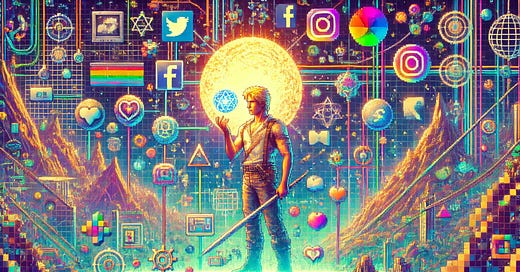



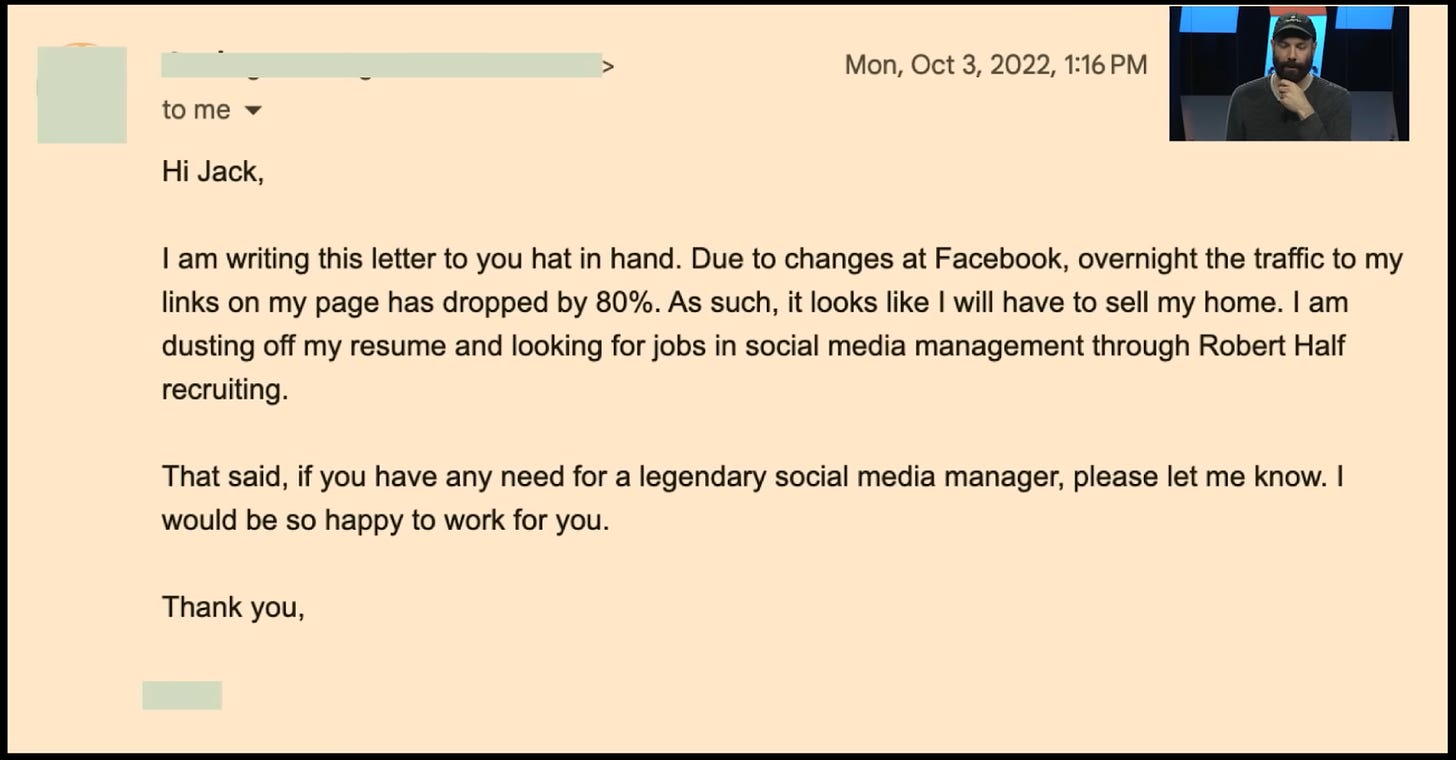
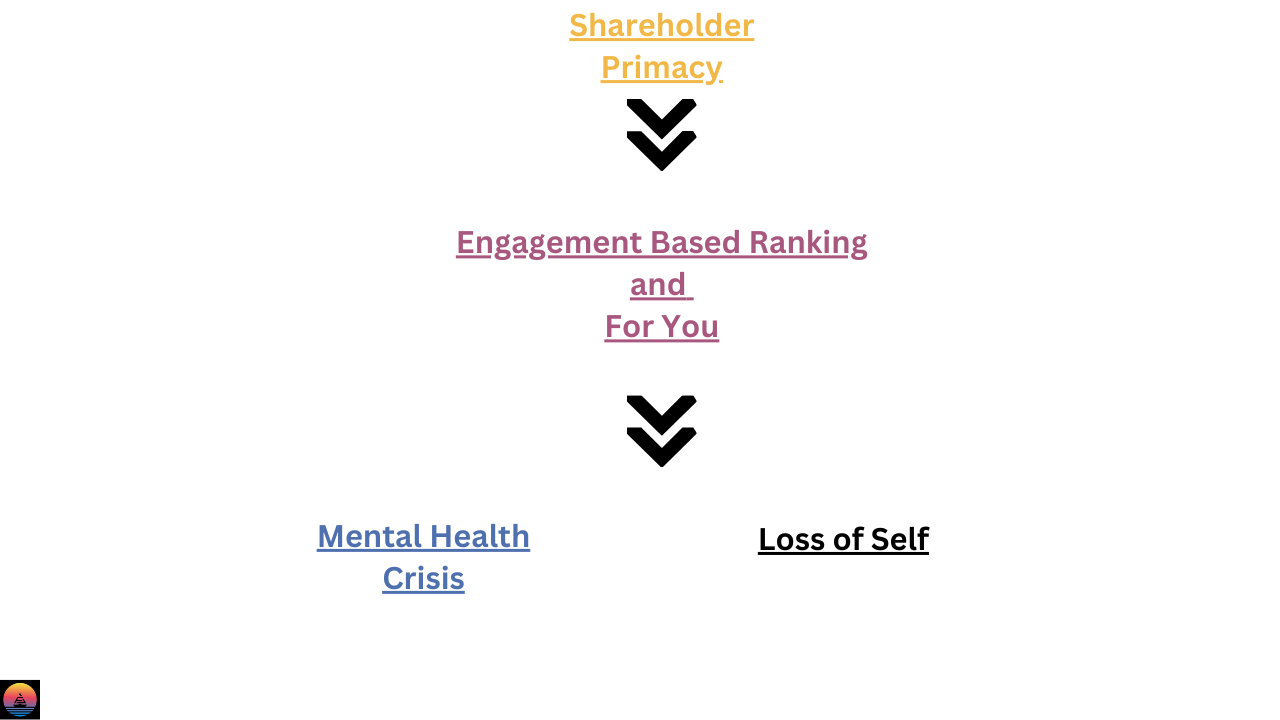
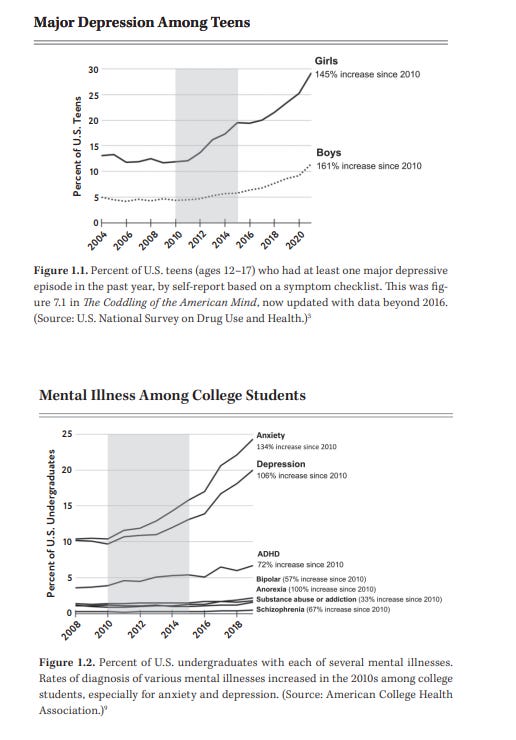
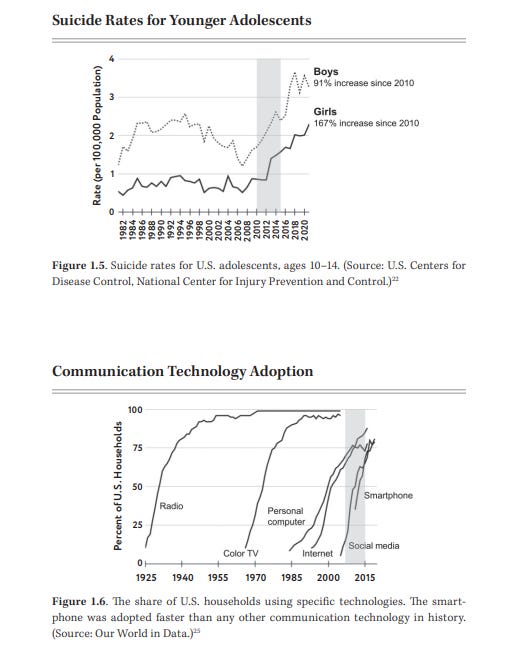
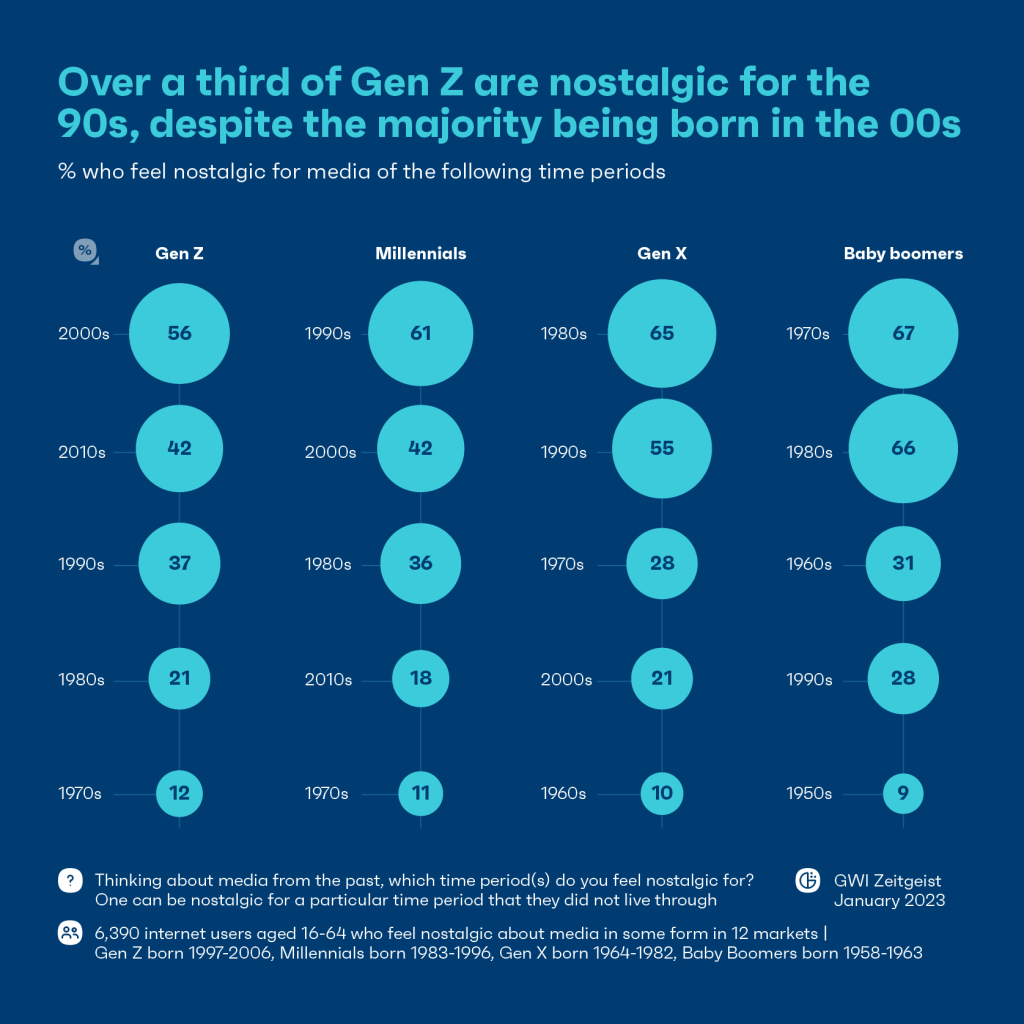
"It's only a matter of time before a culture with extremely advanced technology seeks nourishment of that which is uniquely human." Let's hope! It makes sense.
Fascinating, thought-provoking piece, Dom.
Great article. It's hard to grasp why social media companies haven't figured out an alternative business model to selling ads after all these years.